外研(新标准)版八年级上册Module 11 Way of life Unit 3 Language in use课件(共26张PPT)
文档属性
| 名称 | 外研(新标准)版八年级上册Module 11 Way of life Unit 3 Language in use课件(共26张PPT) |  | |
| 格式 | ppt | ||
| 文件大小 | 2.2MB | ||
| 资源类型 | 教案 | ||
| 版本资源 | 外研版 | ||
| 科目 | 英语 | ||
| 更新时间 | 2022-11-21 17:18:59 | ||
图片预览

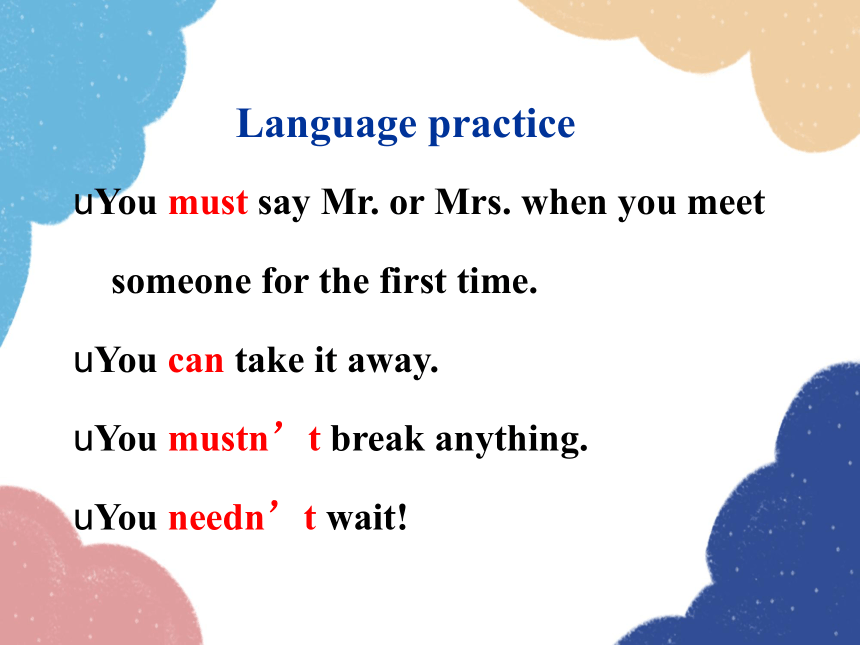

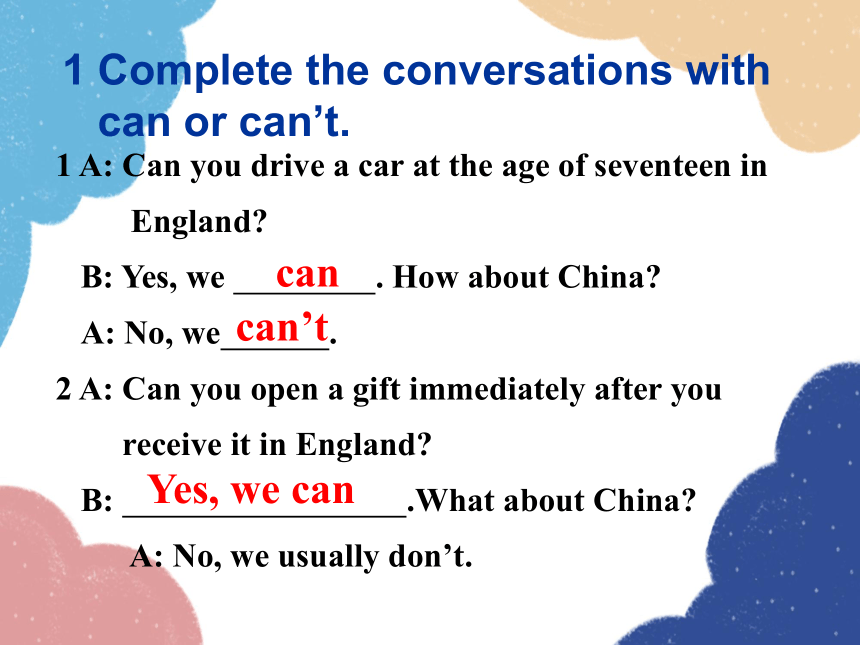
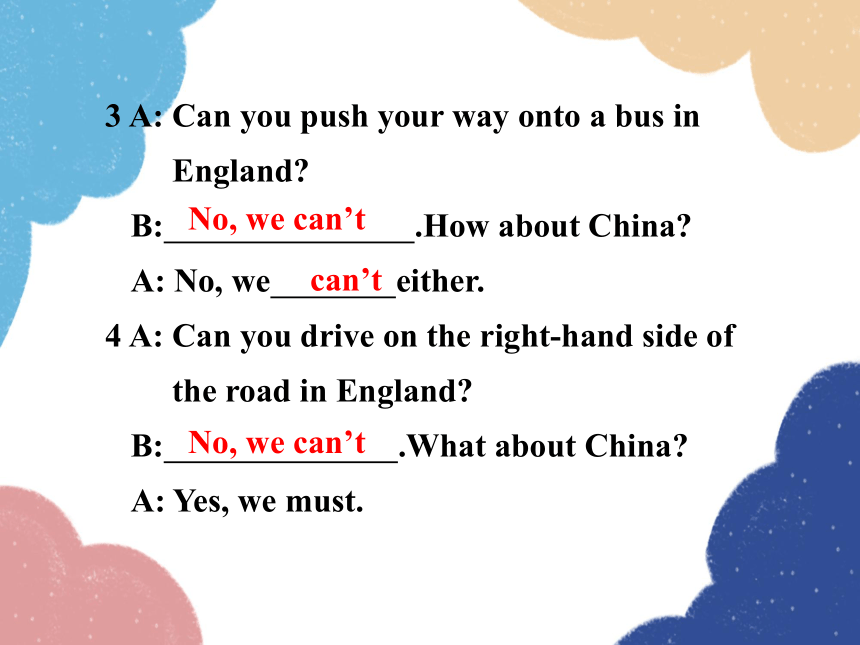
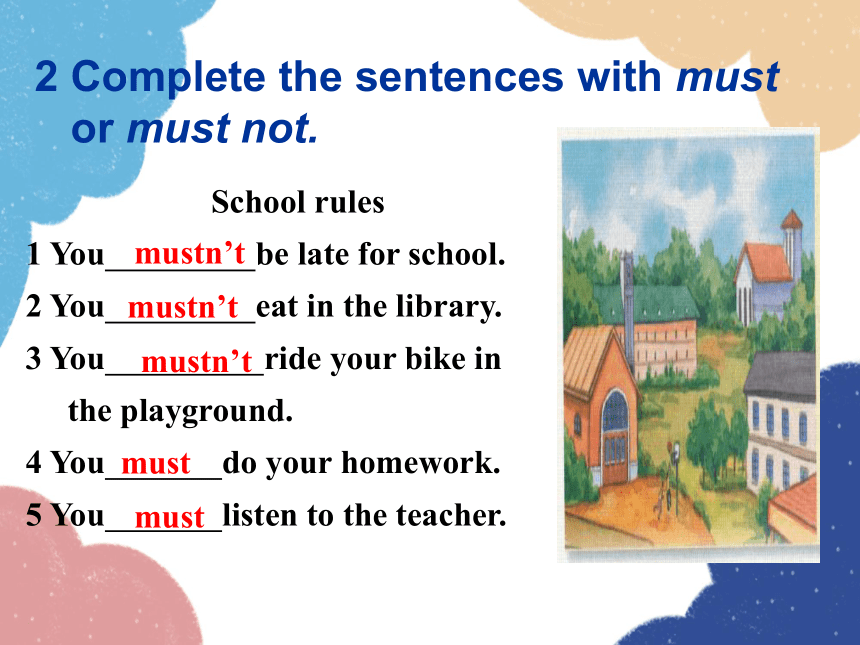
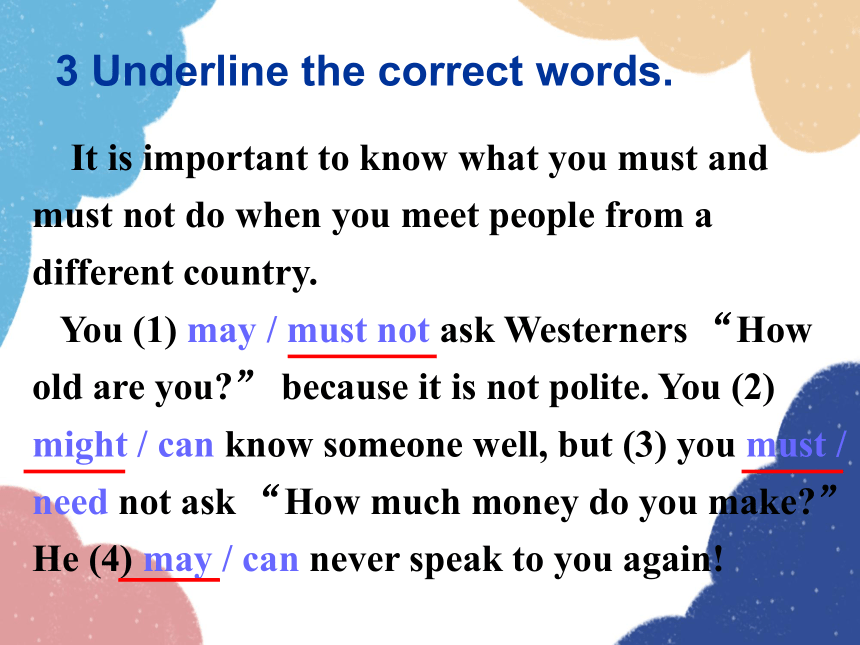
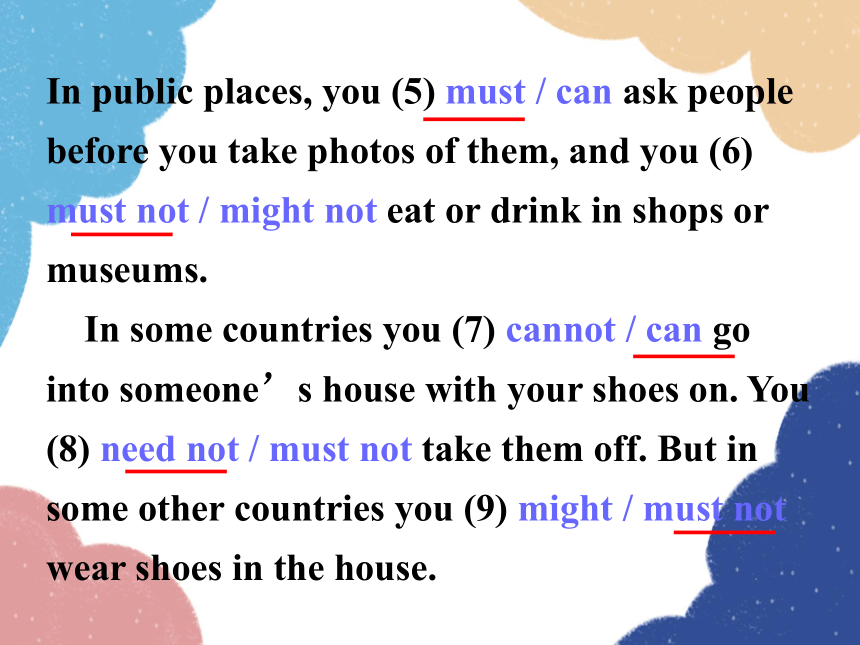
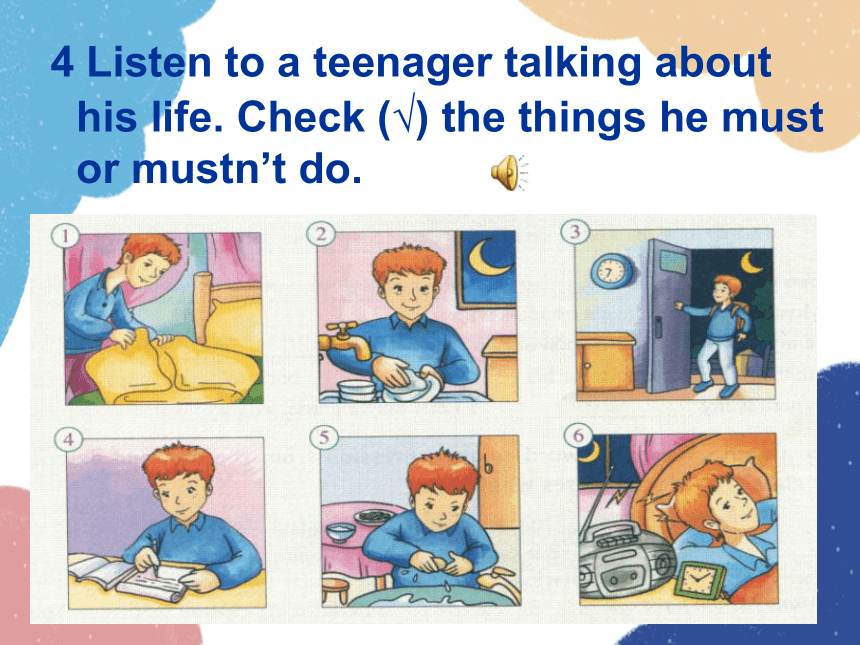
文档简介
(共26张PPT)
11
Module
Unit 3
Language in use
Way of life
Language practice
You must say Mr. or Mrs. when you meet
someone for the first time.
You can take it away.
You mustn’t break anything.
You needn’t wait!
Try to make a face book about cultures of English- speaking countries. Write down the interesting things you find. Look for some pictures to go with them.
Learning to learn
1 A: Can you drive a car at the age of seventeen in
England
B: Yes, we . How about China
A: No, we .
2 A: Can you open a gift immediately after you
receive it in England
B: .What about China
A: No, we usually don’t.
1 Complete the conversations with
can or can’t.
can
can’t
Yes, we can
3 A: Can you push your way onto a bus in
England
B: .How about China
A: No, we either.
4 A: Can you drive on the right-hand side of
the road in England
B: .What about China
A: Yes, we must.
No, we can’t
can’t
No, we can’t
2 Complete the sentences with must
or must not.
School rules
1 You be late for school.
2 You eat in the library.
3 You ride your bike in
the playground.
4 You do your homework.
5 You listen to the teacher.
mustn’t
mustn’t
mustn’t
must
must
3 Underline the correct words.
It is important to know what you must and must not do when you meet people from a different country.
You (1) may / must not ask Westerners “How old are you ” because it is not polite. You (2) might / can know someone well, but (3) you must / need not ask “How much money do you make ” He (4) may / can never speak to you again!
In public places, you (5) must / can ask people before you take photos of them, and you (6) must not / might not eat or drink in shops or museums.
In some countries you (7) cannot / can go into someone’s house with your shoes on. You (8) need not / must not take them off. But in some other countries you (9) might / must not wear shoes in the house.
4 Listen to a teenager talking about his life. Check (√) the things he must or mustn’t do.
√
√
√
√
√
√
5 Listen again. What two things does he say
he can do
1_______________________________________
2_______________________________________
_______________________________________
He can go out with his friends at weekends.
He can play music loudly before ten o’clock
at night.
6 Write some things you can, must and
must not do at home.
Now work in pairs. Tell each other three things you must do at home and three things you mustn’t do. Are you home rules different or the same
e.g. —I must visit my grandparents once a week.
I mustn’t stay up late in the evening.
— ...
I can… I must… I must not…
7 Complete the sentences with the words or
expressions in the box.
baseball cap chess set chopsticks
dictionary present
1 Use your to look up any words
you do not understand.
2 Most Chinese people eat noodles with
_____________.
dictionary
chopsticks
3 Jenny could not wait to open her birthday
__________.
4 He thinks it is cool to wear his _____________
back-to-front.
5 Where is my____________ Let’s play a game.
presents
baseball cap
chess set
8 Play a game. Choose a word or an expression from the box and describe it to the class. The class guesses what it is.
baseball cap bike chess set chocolate chopsticks dictionary fish and chips litter photo video game
A: Many people have one.
B: Is it a chess set
A: No, You use it to get
to places.
C: Is it a bike
A: Yes.
Around the world
Traditional presents
In the West, people often take flowers when they visit someone. Different flowers have different meanings. For example, people often give red roses to someone they love. In Greece, you must not give white flowers because that means that someone is dead.
When you go to a foreign country, it is always best to check what people usually do, so you do not make mistakes.
9 Write some advice for foreign visitors to a Chinese family. Think about:
What must they wear
What mustn’t they talk about
What can’t they do
What presents can they bring
When must they arrive
…
10 Work in pairs. Show the advice you wrote in Activity 9 to your group members. Choose two best pieces of advice.
11 Show the advice your group chose in Activity 10 to the whole class. Put the pieces of advice together to form the advice of the whole class.
Then send the advice of the whole class to your foreign friends or post it on your class blog.
When you go to a foreign country, it is always best to check what people usually do so you do not make mistakes.
当你去国外时,你最好打探好人们的日常行为习惯,那样就不会犯错。
make a mistake “ 犯错
It's careless of her to make such mistake.
她犯这样的错误真是太粗心了。
This is all new to me , so let me know if I make a mistake .
这是我的第一次,所以错了请告诉我。
Language points
1. He said that you _____ watch TV all the
evening if you wished.
A. may B. must C. can D. might
2. -Is John coming by train
-He should, but he __________ not. He likes
driving his car.
A. must B. can C. need D. may
3. Michael ____ be a policeman, for he's much
too short.
A. needn't B. can't C. shouldn't D. won't
D
D
B
Exercise
4. I thought you ____be hungry, so I have
brought you some cakes.
A. may B. might C. can D. could
5. Come on! We __________ hurry because
there isn't much time left.
A. may B. must C. can D. need
6. ___ I take this one
A. May B. Will C. Are D. Do
7 You'd better ___ late next time.
A. not to be B. not be C. won't be D. don't be
B
B
A
B
Homework
Read more materials about foreign culture
and customs.
Try to recite all the new words in this unit.
11
Module
Unit 3
Language in use
Way of life
Language practice
You must say Mr. or Mrs. when you meet
someone for the first time.
You can take it away.
You mustn’t break anything.
You needn’t wait!
Try to make a face book about cultures of English- speaking countries. Write down the interesting things you find. Look for some pictures to go with them.
Learning to learn
1 A: Can you drive a car at the age of seventeen in
England
B: Yes, we . How about China
A: No, we .
2 A: Can you open a gift immediately after you
receive it in England
B: .What about China
A: No, we usually don’t.
1 Complete the conversations with
can or can’t.
can
can’t
Yes, we can
3 A: Can you push your way onto a bus in
England
B: .How about China
A: No, we either.
4 A: Can you drive on the right-hand side of
the road in England
B: .What about China
A: Yes, we must.
No, we can’t
can’t
No, we can’t
2 Complete the sentences with must
or must not.
School rules
1 You be late for school.
2 You eat in the library.
3 You ride your bike in
the playground.
4 You do your homework.
5 You listen to the teacher.
mustn’t
mustn’t
mustn’t
must
must
3 Underline the correct words.
It is important to know what you must and must not do when you meet people from a different country.
You (1) may / must not ask Westerners “How old are you ” because it is not polite. You (2) might / can know someone well, but (3) you must / need not ask “How much money do you make ” He (4) may / can never speak to you again!
In public places, you (5) must / can ask people before you take photos of them, and you (6) must not / might not eat or drink in shops or museums.
In some countries you (7) cannot / can go into someone’s house with your shoes on. You (8) need not / must not take them off. But in some other countries you (9) might / must not wear shoes in the house.
4 Listen to a teenager talking about his life. Check (√) the things he must or mustn’t do.
√
√
√
√
√
√
5 Listen again. What two things does he say
he can do
1_______________________________________
2_______________________________________
_______________________________________
He can go out with his friends at weekends.
He can play music loudly before ten o’clock
at night.
6 Write some things you can, must and
must not do at home.
Now work in pairs. Tell each other three things you must do at home and three things you mustn’t do. Are you home rules different or the same
e.g. —I must visit my grandparents once a week.
I mustn’t stay up late in the evening.
— ...
I can… I must… I must not…
7 Complete the sentences with the words or
expressions in the box.
baseball cap chess set chopsticks
dictionary present
1 Use your to look up any words
you do not understand.
2 Most Chinese people eat noodles with
_____________.
dictionary
chopsticks
3 Jenny could not wait to open her birthday
__________.
4 He thinks it is cool to wear his _____________
back-to-front.
5 Where is my____________ Let’s play a game.
presents
baseball cap
chess set
8 Play a game. Choose a word or an expression from the box and describe it to the class. The class guesses what it is.
baseball cap bike chess set chocolate chopsticks dictionary fish and chips litter photo video game
A: Many people have one.
B: Is it a chess set
A: No, You use it to get
to places.
C: Is it a bike
A: Yes.
Around the world
Traditional presents
In the West, people often take flowers when they visit someone. Different flowers have different meanings. For example, people often give red roses to someone they love. In Greece, you must not give white flowers because that means that someone is dead.
When you go to a foreign country, it is always best to check what people usually do, so you do not make mistakes.
9 Write some advice for foreign visitors to a Chinese family. Think about:
What must they wear
What mustn’t they talk about
What can’t they do
What presents can they bring
When must they arrive
…
10 Work in pairs. Show the advice you wrote in Activity 9 to your group members. Choose two best pieces of advice.
11 Show the advice your group chose in Activity 10 to the whole class. Put the pieces of advice together to form the advice of the whole class.
Then send the advice of the whole class to your foreign friends or post it on your class blog.
When you go to a foreign country, it is always best to check what people usually do so you do not make mistakes.
当你去国外时,你最好打探好人们的日常行为习惯,那样就不会犯错。
make a mistake “ 犯错
It's careless of her to make such mistake.
她犯这样的错误真是太粗心了。
This is all new to me , so let me know if I make a mistake .
这是我的第一次,所以错了请告诉我。
Language points
1. He said that you _____ watch TV all the
evening if you wished.
A. may B. must C. can D. might
2. -Is John coming by train
-He should, but he __________ not. He likes
driving his car.
A. must B. can C. need D. may
3. Michael ____ be a policeman, for he's much
too short.
A. needn't B. can't C. shouldn't D. won't
D
D
B
Exercise
4. I thought you ____be hungry, so I have
brought you some cakes.
A. may B. might C. can D. could
5. Come on! We __________ hurry because
there isn't much time left.
A. may B. must C. can D. need
6. ___ I take this one
A. May B. Will C. Are D. Do
7 You'd better ___ late next time.
A. not to be B. not be C. won't be D. don't be
B
B
A
B
Homework
Read more materials about foreign culture
and customs.
Try to recite all the new words in this unit.
同课章节目录
- Module 1 How to learn English
- Unit 1 Let's try to speak English as much as possi
- Unit 2 You should smile at her.
- Unit 3 Language in use .
- Module 2 My home town and my country
- Unit 1 It's taller than many other buildings.
- Unit 2 Cambridge is a beautiful city in the east o
- Unit 3 Language in use .
- Module 3 Sports.
- Unit 1 Nothing is more exciting than playing tenni
- Unit 2 This year we training more carefully.
- Unit 3 Language in use .
- Module 4 Planes, ships and trains .
- Unit 1 He lives the farthest from school.
- Unit 2 What is the best way to travel.
- Unit 3 Language in use .
- Module 5 Lao She Teahouse.
- Unit 1 I wanted to see the Beijing Opera.
- Unit 2 It descibes the changes in Chinese society.
- Unit 3 Language in use .
- Module 6 Animals in danger.
- Unit 1 It allows people to get closer to them .
- Unit 2 The WWF is working hard to save them all.
- Unit 3 Language in use .
- Revision module A
- Module 7 A famous story
- Unit 1 Alice was sitting with her sister by the ri
- Unit 2 She was thinking about her cat.
- Unit 3 Language in use .
- Module 8 Accidents
- Unit 1 While the car were changing to red, a car s
- Unit 2 I was trying to pick it up when it bite me
- Unit 3 Language in use .
- Module 9 Population
- Unit 1 The population of China is about 1.37 billi
- Unit 2 Arnwick was a city with 200,000 people.
- Unit 3 Language in use .
- Module 10 The weathe
- Unit 1 It might snow.
- Unit 2 The weather is fine all year round.
- Unit 3 Language in use .
- Module 11 Way of life
- Unit 1 In China ,we open a gift later.
- Unit 2 In England, you usually drink tea with milk
- Unit 3 Language in use .
- Module 12 Help
- Unit 1 What should we do before help arrives?
- Unit 2 Stay away from windows and heavy furniture.
- Unit 3 Language in use .
- Revision module B
